Stories for Days
“The Midlands Literary Festival has come of age,” remarked Elana Bregin, a writer who has participated in all eight past events.
This year, on the first weekend in September, many hundreds of people arrived at Fern Hill Hotel to enjoy an astonishing array of authors speaking about their work. There literally was something for everyone.
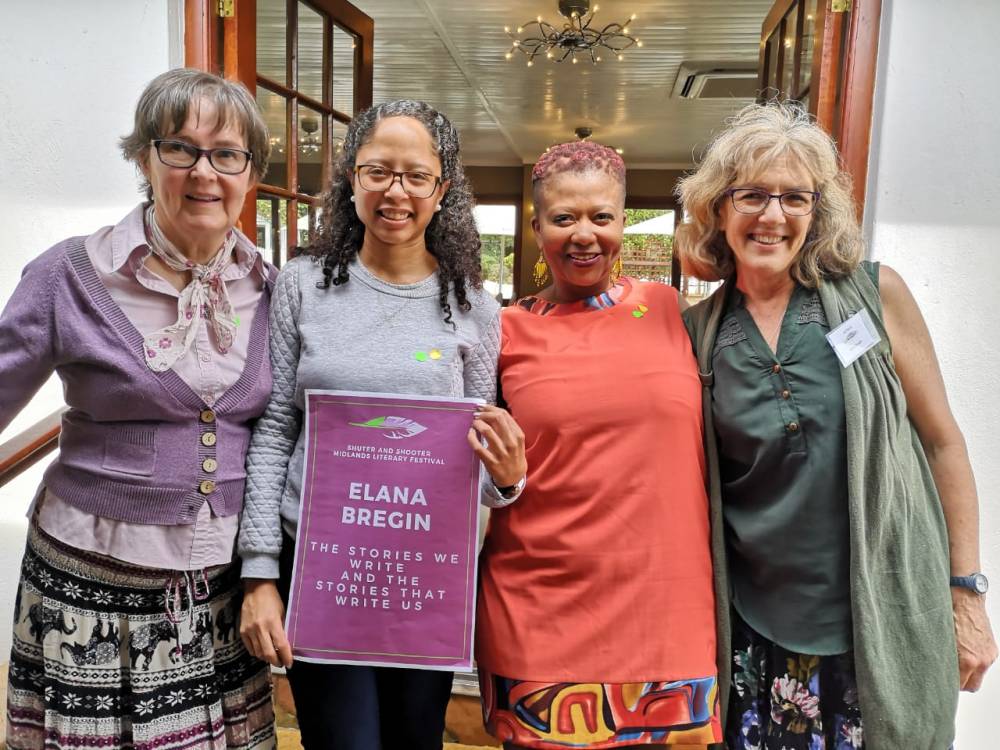
History enthusiast, Chris Moore, came up from Durban to learn more about old farmhouses, Drakensberg passes, the Boer War and Trappist missions. “All such incredible books, but unfortunately my book budget can’t stretch to buying them all.” Despite these constraints echoed by many, some books sold out after their riveting presentations, and most authors reported good sales. What did you take home?

On Saturday morning, Jackie Kalley admitted that she had struggled with the problematic colonial nature of her beautiful book Old Farmhouses of Natal. “I used words like ‘immigrant’ and ‘newcomers’ to describe the settlers who built these magnificent homes.” Her presentation focused on the property of her ancestors – the Anderson family in Byrne, Richmond and Creighton. One striking childhood memory was of Lilydale, which overlooked an arum filled vlei and had a frieze of arums painted high on the living room walls. Sadly, this beautiful building is now a ruin, although many others are not. Often, descendants of the original pioneers still live in, and cherish, this valuable built history.

Nico Moolman, reflecting on the Festival, remarked on “the beauty of it all” and enthralled the audience with his book The Boer Whore OHMS – a tribute to all women who had suffered in so many ways during the war. “I was so surprised that I enjoyed this talk,” said Lindiwe Mkhize, “It was not what I expected and I learnt so much.”

David Robbins shared vivid vignettes from his book Walking to Australia and the relationships he developed with the guides he met in each country – making links between the ancient past and the complex present. They offered insights he may otherwise have missed – such as the Ethiopian who declared that the mosques feeding the wild hyenas was ‘the beginning of morality’.
Paul Welch, editor of Mountain Echo based in Underberg, had a thoroughly good time at the Festival and loved David’s talk. “I was intrigued by the idea that we construct our own God and was reminded of how conquering religions have always destroyed the artifacts of others – long before ISIS blew up the Buddha.” When asked how he funded this sweeping adventure across 21 countries, David explained that a bequest from a 94 year old friend had made it possible.
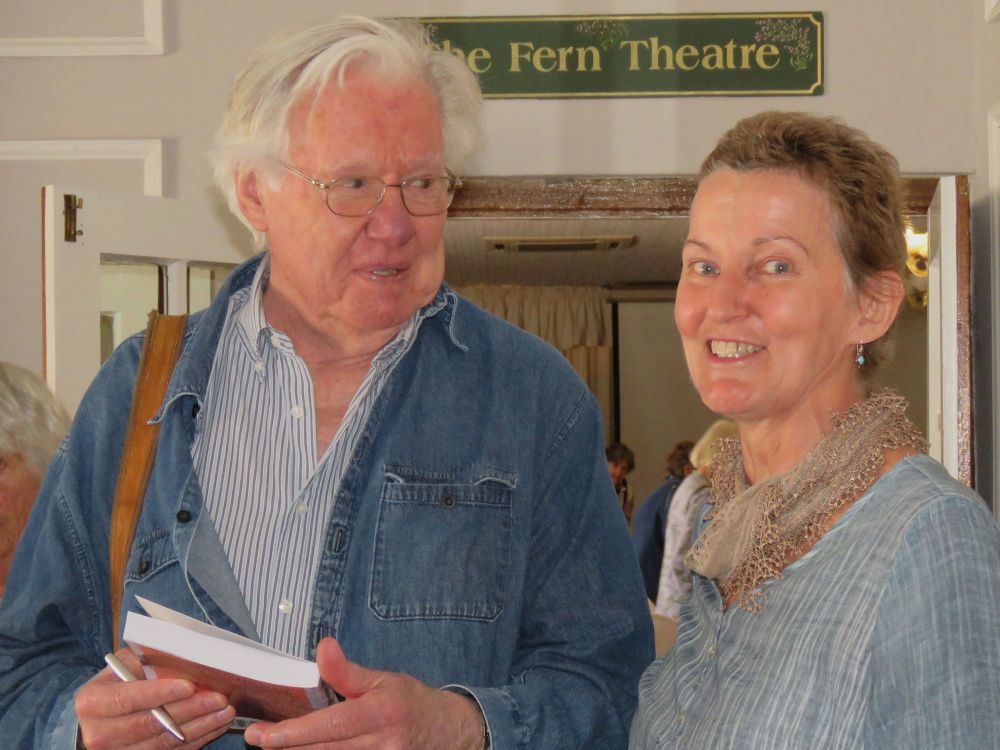
Ed Ostrosky’s Macpherson’s Elephant, though a novel, was inspired by events that occurred in and around the Tembe Elephant Park in the late 1980s and early ’90s. With photographs from his time as a ranger, Ed was able to horrify the audience with the gruesome reality of elephant poaching in those times. His hero, Stuart Macpherson, soldier turned game ranger, and a handful of game scouts had to stop the killing…

Tracy Going told us she had always known she had a story to tell, but the question was when to write it. When Reeva Steenkamp was murdered by Oscar Pistorius she decided it was time. Even so, she often wondered in the final stages of publishing her book Brutal Legacy, describing domestic violence, if she had done the right thing. “Once it is out there, you can’t take it back. Did I really want people to know so much about me? Now I often get long meaningful hugs from strangers in the shopping centre!”
Shea O’Connor School pupil and budding poet, Nomcebo Nzuza was particularly impressed by Tracy’s bravery, and touched by her statement that by telling our stories we set others free to tell their own stories too. “There is a lot of domestic violence in my community, and even on TV – it is made to seem normal. But it is not. One day I hope to read my work at the Festival,” Nomcebo commented.
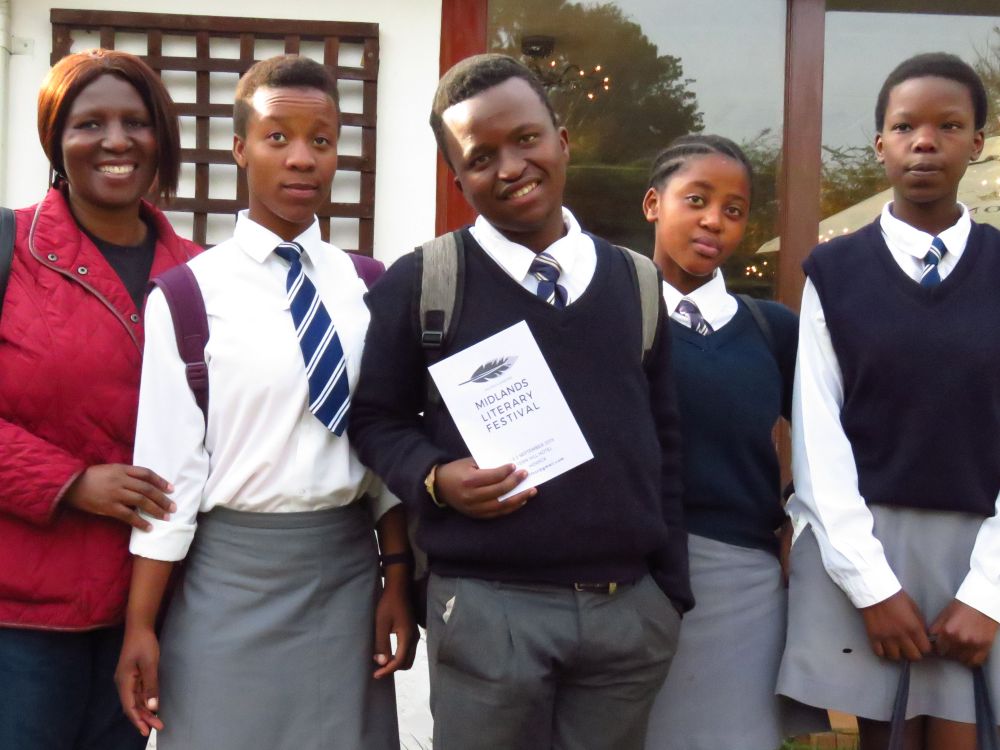
Pulane Mabeae’s day was made when she settled down for tea with Tracy. Pulane, who had won the book Brutal Legacy in a radio phone-in, had come especially to meet her, and felt connected already. Tracy commented “It is moments like this – meeting other women and sharing our common story that makes it all worthwhile.” Tracy thought MLF2018 was one of the best book festivals she had attended – unpretentious, intimate and devoid of overbearing egos.

Tour guide, Nicki von der Heyde, got people really excited about the 22 Trappist missions in her latest publication. In addition to taking a vow of silence, Trappist monks promise to always sleep under a Trappist roof. What then could be behind the extraordinary explosion of missionary activity initiated by Trappist monks in Natal in the late 1800s. Nicki recommends keeping a copy of this small book in your car so that you don’t miss the Trappist churches, KZN’s ‘hidden jewels’ waiting to be discovered and appreciated.
Keen reader Thembeka Dambuza, was thrilled to come across new authors and books that she would never have thought of picking up before. “I was struck this morning by how much I do not know! I’m definitely buying this missions book,” she said.
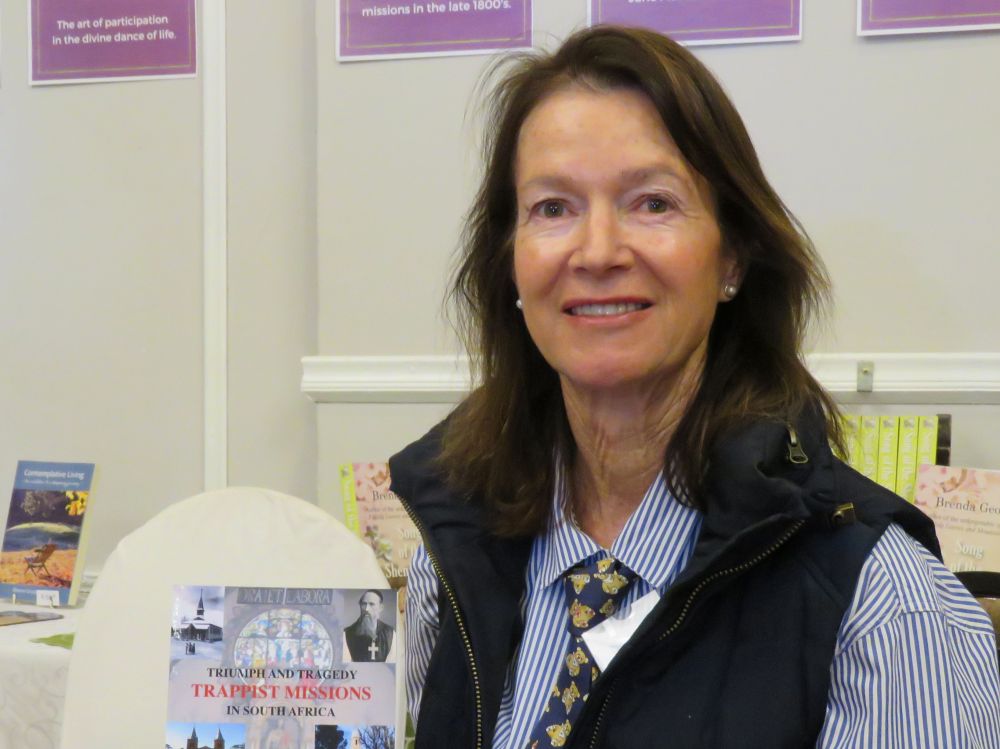
Gillis van Schalkwyk got the audience in a spin when he explained that de Beers Pass was not named after Rachel de Beer. Remember the story we learnt at school about the girl who sacrificed her life to save her little brother? He then went on to tell us that there was absolutely no evidence the Racheltjie had ever existed and that the story was probably made up by Eugene Marais! Gillis’ book The Drakensberg Passes is crammed with fascinating information on how the passes got their names and the stories that surround them.
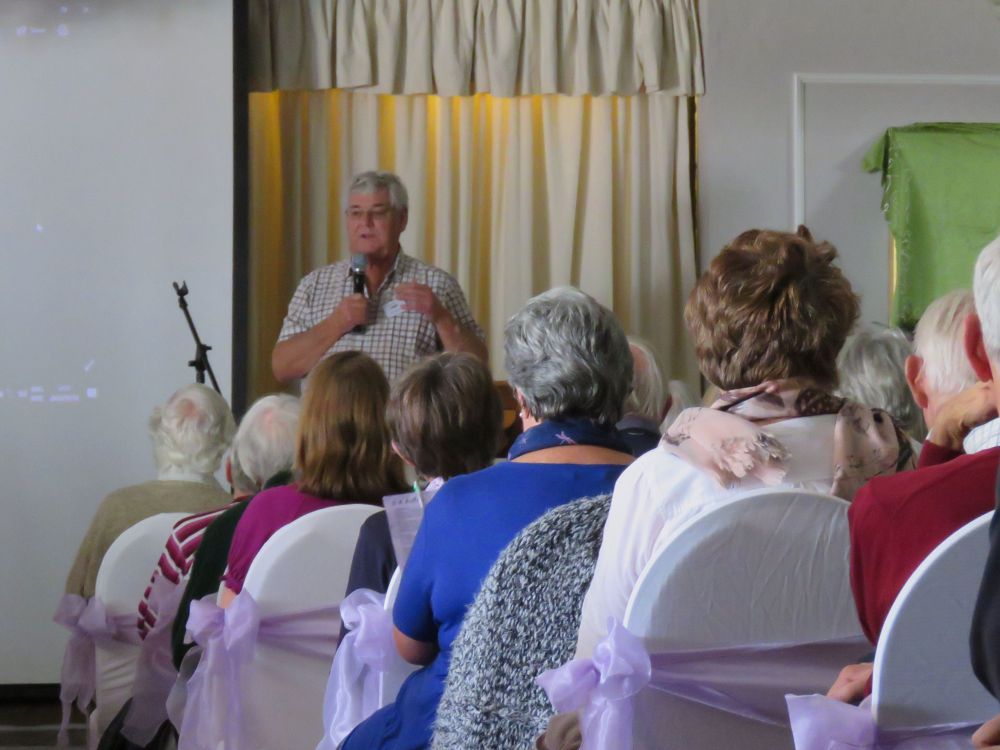
“The title arrived on a Monday morning in 2007 outside a hardware store. A few weeks later in Springs I waited for someone next to a pool of stagnant mine water with reeds and water fowl. I wrote what I thought was an opening line in a notebook. For a long time it remained only a title. The xenophobic attacks of May 2008 and the fact that the violence spilt over into the suburb where my unwritten book was set, was a trigger. I was horrified by the proximity of the violence to my cosy middle-class existence, the brutality of the attacks and what it said about our society and set to work,” said Afrikaans writer Harry Kalmer about his book A Thousand Tales of Johannesburg – vignettes that capture hidden histories and unusual stories of the city. Then he realised that half his friends and family would not be able to read his book if he did not translate it into English – so he did just that – and won the Sunday Times Prize for Best Fiction.

Everyone enjoyed a little fresh air at lunch to clear their heads, and fill their tummies. Fern Hill Hotel provided very delicious food and somehow managed to feed the masses of people who arrived. Phillipa Gordon enjoyed meeting old friends and making new ones. “A great day out with great conversations,” she said with a grin.
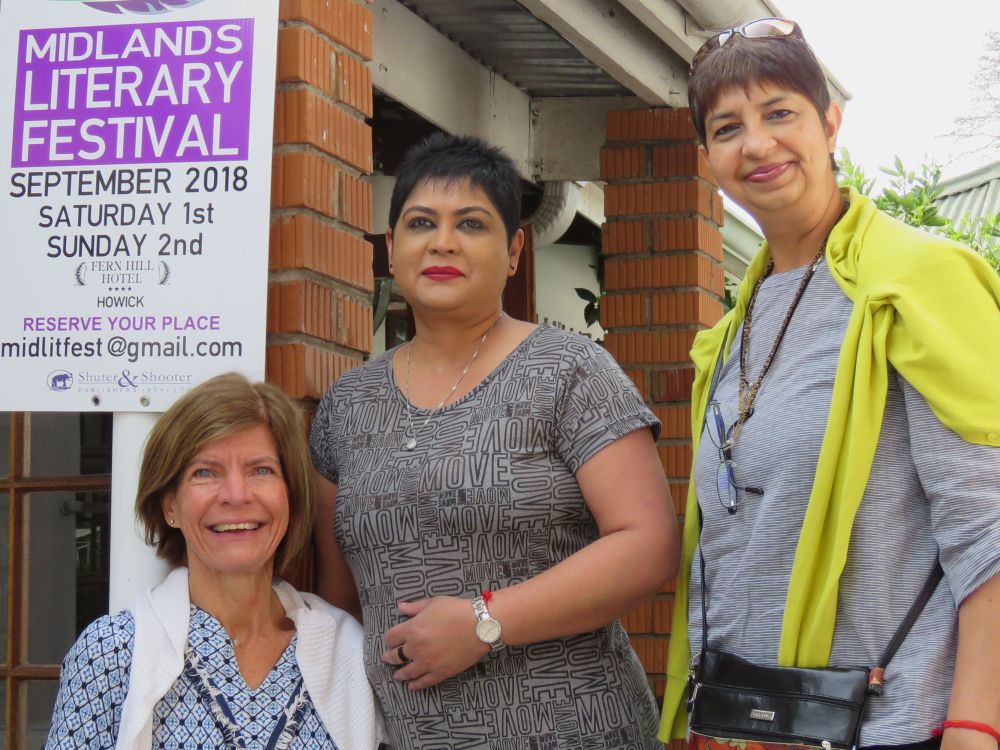
As life becomes increasingly pressured, there is a ground-swell of interest in a more contemplative way of living. There is a yearning for inner freedom and spaciousness and a deepening quest for meaning. Quantum computational physicist Sharon Grussendorff drew on her own inspiring journey, where she has grappled with finding the balance between Contemplative Living (the name of her book) and relevant engagement in the world.
Sharon, co-founder of Solitude retreat centre in the Dargle, loved her time at the Festival. “It was such a pleasure and privilege, you all did something very special in this festival, it was stimulating, varied and moving. Not to mention well publicised!”

Kirsten Miller discussed the importance of stories as a social narrative in her presentation on her book The Hum of the Sun and reassured us that autism is a neurodevelopment disorder, and is NOT caused by bad parenting. While there have been many books feauring the autism spectrum (eg The Curious Incident of the Dog in the Night), they mostly document cases where high care in affluent communities is possible. In her novel, she recounts the journey of two young boys to find their only living relative. On the brink of manhood, Ash must protect eight year old Zuko, who does not speak. But Zuko, enchanted by nature and the rhythms of walking, seems more interested in the patterns he sees in the clouds, the stones, and the arc of the light, than in when their journey will end. Part of the proceeds of sales of Kirsten’s books go to the NGO Action in Autism.
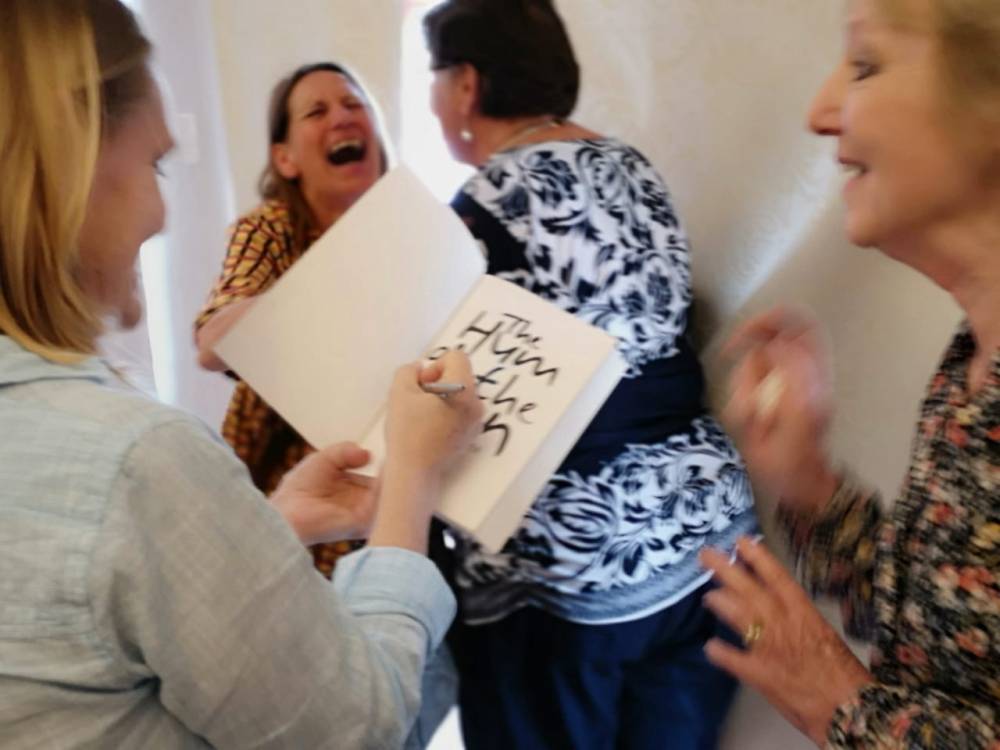
Cape Town based author Landa Mabenge, was visiting the KZN Midlands for the first time. He got a standing ovation for his confident, heartwarming and often humourous presentation on his book Becoming Him in which he describes his transgender journey and the importance of acceptance, even if forgiveness is not possible. “What a wonderful speaker,” remarked Val Martin Ferrar.
“I love to really connect with people. This audience was so engaged and asked such good questions. I had an amazing time and hope to be back,” said Landa.
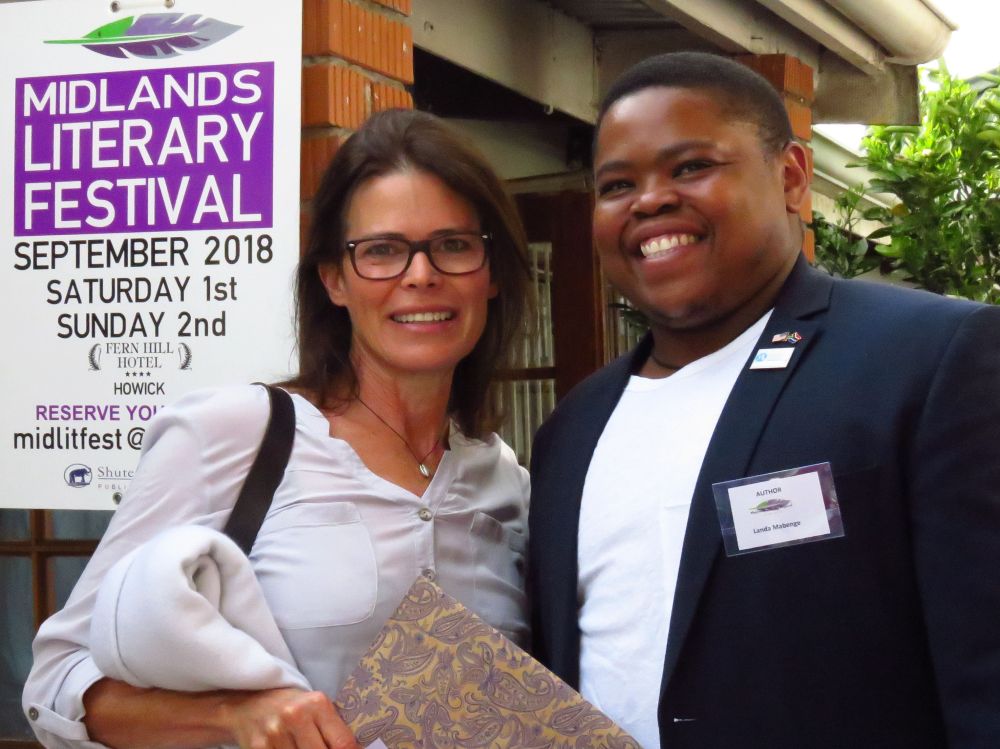
We may have felt exhausted at the end of the day, but no one left the auditorium before Jacques Pauw arrived. There was plenty of opportunity to ask Jacques questions about his explosive work The President’s Keepers and engage in conversation as he signed copies of his book.
Hlengiwe Kheswa thought Jacques’ presentation was outstanding. “I loved the line from his book ‘I don’t want to die of corruption fatigue’- I don’t want to either. The authors are all go-getters and I enjoyed their interaction with the audience. I feel sad about the ‘fire generation’ – those who set fire to Libraries and Information hubs – I wish they could have been there too.”
Enterprising Hlengiwe is organising the Rural Book Reading Festival in Ixopo to commemorate the 70th anniversary of Alan Paton’s Cry the Beloved Country, on 25 September. If you are interested in participating, and helping her encourage youngsters to love books and reading, contact her 078 216 6465 or hlengiwereineth@gmail.com .
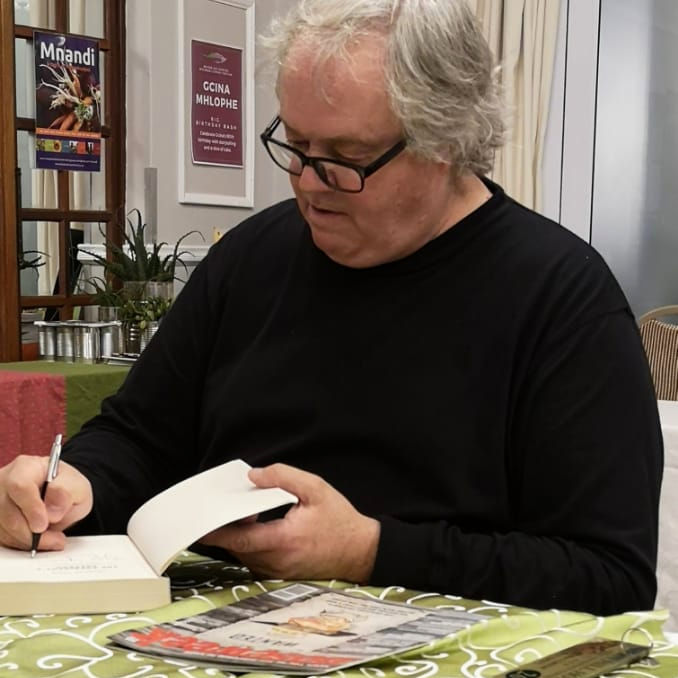
Then, as the sun began to sink, we headed to the fairy light festooned deck for some poetry recited by the Steampunk Poets. Paul Hildyard read P.O.W – Poetry on Wednesday which descried the monthly open mic poetry sessions at Steampunk Cafe in Lions River. Debra Anderson shared a tribute to a lost friend, Nikki Brighton a description of a wander along Harvard Street in Howick and Glenn Read a tender observation of a father and son relationship.
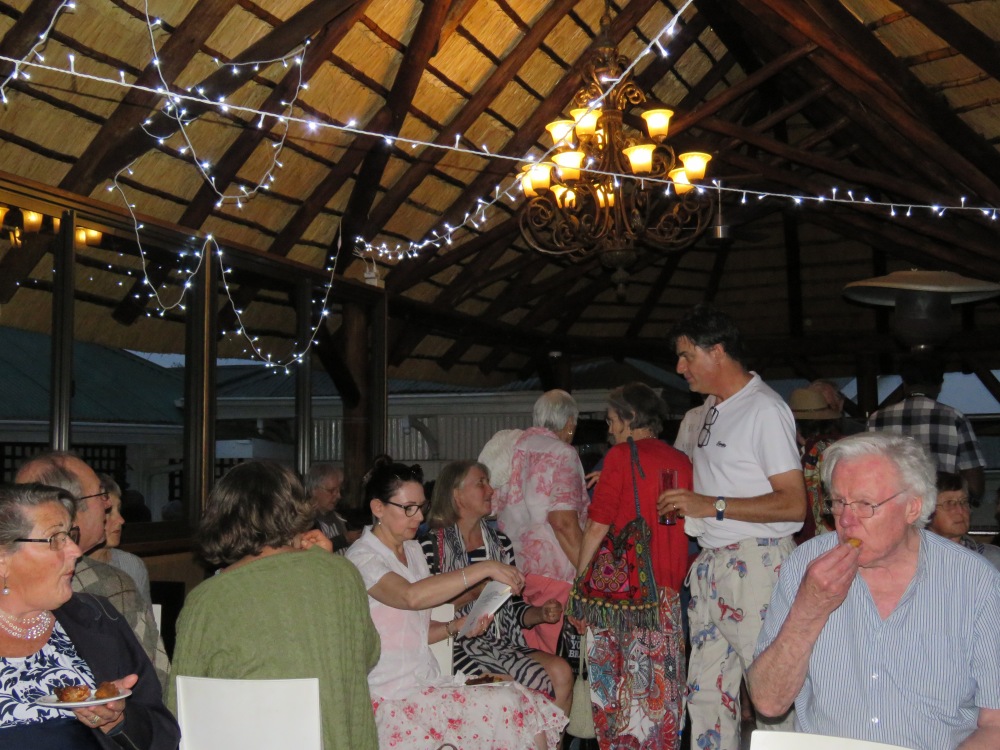
Sunday morning was all about writing.
We began with the utterly delightful Helena Davis sharing her writing journey, spurred by chronic insomnia. “Lying awake endlessly, I wondered how I used to fall asleep so easily as a child, and remembered my mother always told me stories. So I closed my eyes and decided to tell myself as story. I began with Once Upon A Time… Curiously, when I started to write down these tales, the buzzing in my head stopped and I could sleep again.” Helena shared a list of all the ‘buts’ and ‘blockages’ she has overcome to prevent her from writing. “Writing is the the bestest, nicest, heaven-in-a-nutshell thing you can do, so if you are secretly thinking of writing, just do.”

The next speaker, Brenda George concurred, “The only way to start is just to start. Pay attention to your dreams and sometimes, you will feel like a ballpoint pen that has gone a bit dry. You need to wiggle it a bit to get the juices flowing again.” Brenda shared her thoughts on self-publishing, discussing the pro’s and the pitfalls. She was full of praise for the organisers of the festival too. “It was the most WONDERFUL, AMAZING, OUT-OF-THIS-WORLD festival imaginable! I loved every single second of it. A two-day feast of utter superlative fun, knowledge-gaining and downright enjoyment. The mass concentration of writers stirred the air and gave sweet succour to the soul – a very rich experience.”
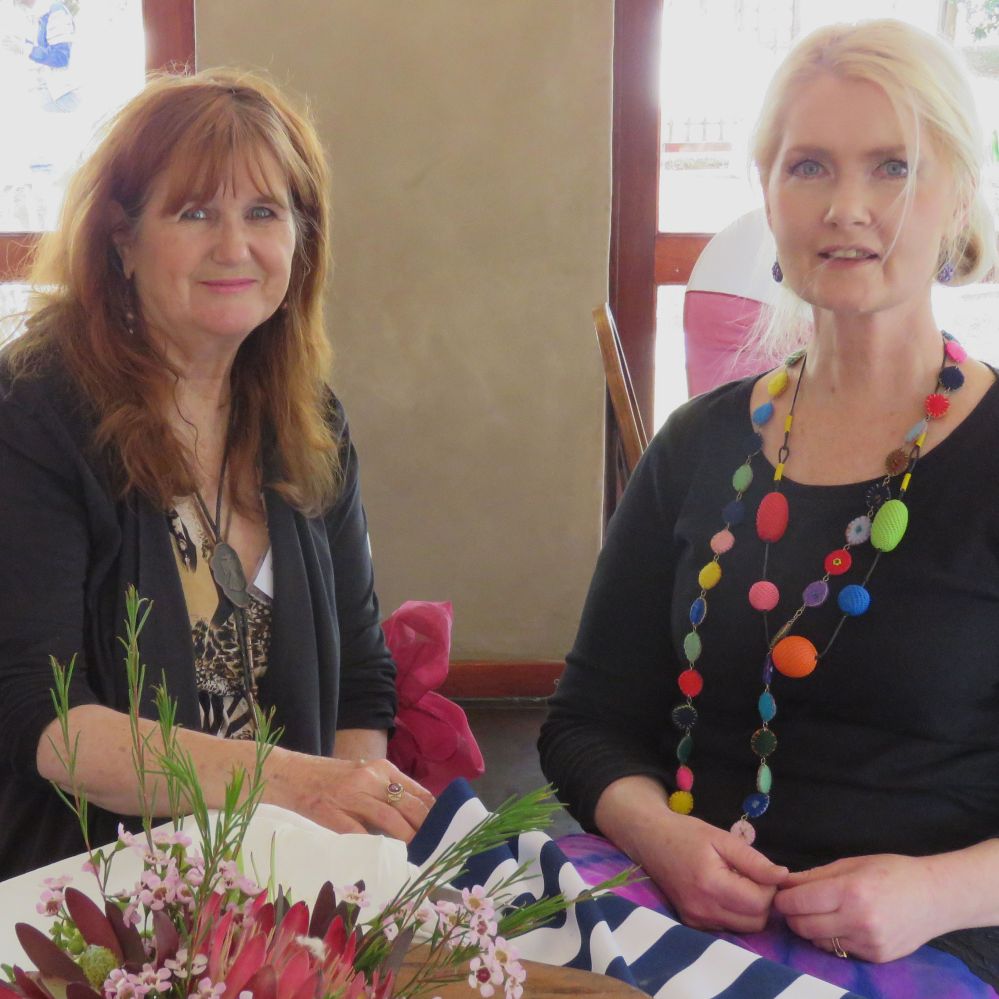
Helena added her praise for the festival organisers “Wow, what a fabulous Book Festival this year! Thank you for inviting me and for giving all of us authors the opportunity to speak on what we are passionate about. It was so heart-warming to mingle with other like-minded book folk (and such fun to open our Mid Lit Fest Goodie-Bag!)”

Andrea Nattrass, who is the publisher at Pan Macmillan shared useful information on how to find a publisher and get your work noticed. She suggested that aspiring writers do plenty of research about which publishing house would suit their work best, and also cautioned that the industry was not as robust as before, with traditional readers becoming time poor and reading less. “Look out for Open Submission opportunities,” she advised, “last year we received 186 works during ours, shortlisted to 15 and then only one was published.”
Veteran of the Midlands Literary festival, Elana Bregin, encouraged members of the audience to simply write. “If you ignore an idea, it may pass through you and loose its vibrancy. Rather just let it tumble out while it is fresh and polish it later. Trust that your story knows what it is doing.”
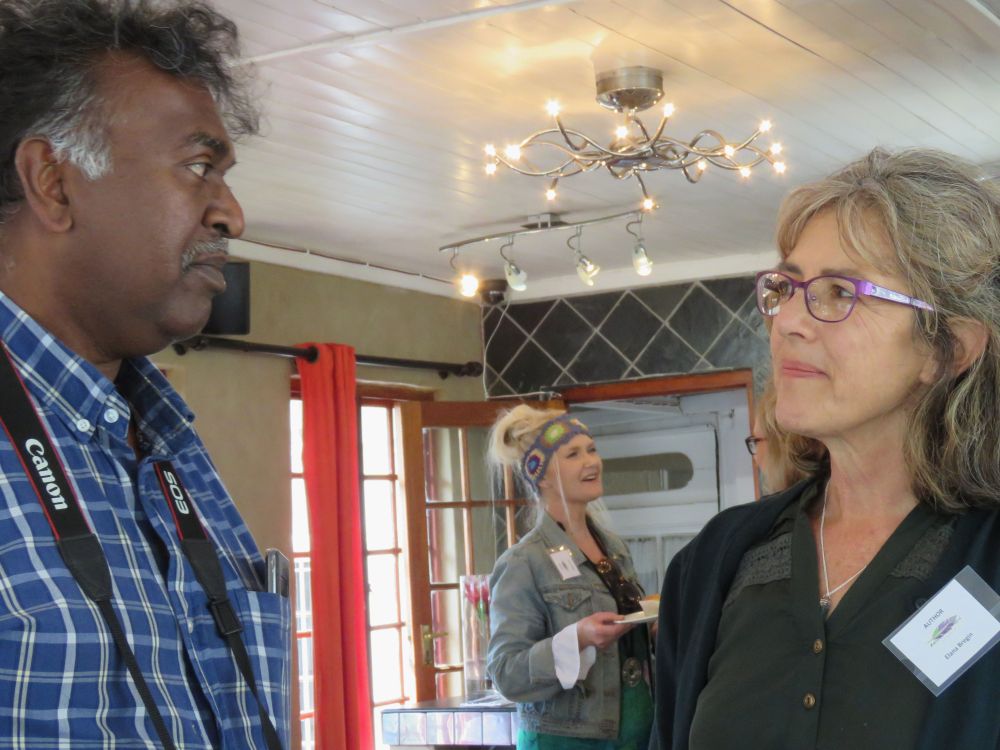
Darryl David, initiator of the Midlands Literary Festival thanked the morning’s speakers for the magnificent, entertaining and informative session before we all headed into the tea room to chat, chat, chat – to share idea and inspirations, snippets of information and our experiences or writing and publishing.

Armed with new books and heads brimming with ideas, many people left inspired to start their writing journeys. Quite likely some of them will have published their books before the 10th annual Midlands Literary Festival in Spring 2019.

After tea, Bongani Ngqulunga who flew in from Asia the day before to attend the MLF2018, shared a little of the extraordinary story of Pixley ka Isaka Seme – The Man who Founded the ANC. We were amused to learn that Pixley awarded himself the title of Doctor, when no honorary doctorate was forthcoming. “The story of Seme demonstrates that our past is as complex as our present. And herein perhaps lies the significance of the book: it cautions us against accepting oversimplified versions of our history. The person who reads this book will be struck by the similarities between what went on in the ANC 80 years ago and what is going on now.”

As a young man in search of adventure, Mark de Wet met a man in an Athenian sandal shop who turned out to be a very famous Greek poet. During a late night fueled by plenty of wine in the Plaka he made a promise to write a South African version of Omar Khayyam’s epic poem ‘Rubaiyat’, as his new friend had done in Greek.
The Cape Rubaiyat is avisual fusion of wine and poetry about the Cape Wines. After a show of hands from those who like wine and those who like poetry, Mark chose enthusiastic Debra Anderson one who loved both, uncorked a bottle of very good Cape red and invited her to read several verses!

Underberg vet, Todd Collins regaled us with tales of elusive trout, crocodiles caught and dam walls that burst. However, the main thrust of his presentation on his book The Art of Being… an Awful Angler was about living in the present. Recognising special moments of connection to the beauty of nature and the world around us – a piece of music, a delicately coloured bird or precious time with a grandchild. Marine ecologist Fortune Shoniwa loved his talk and shared her own story of knowing all the names of the species in her field of specialty, but when academics visited from abroad she was unable to tell them anything about the birds and trees they encountered. This memory bothered her for many year, but on a retreat led by Sharon Grussendorff, she let go of this and realised the value of just being in the moment – appreciating the beauty for what it was and not needing to name everything.
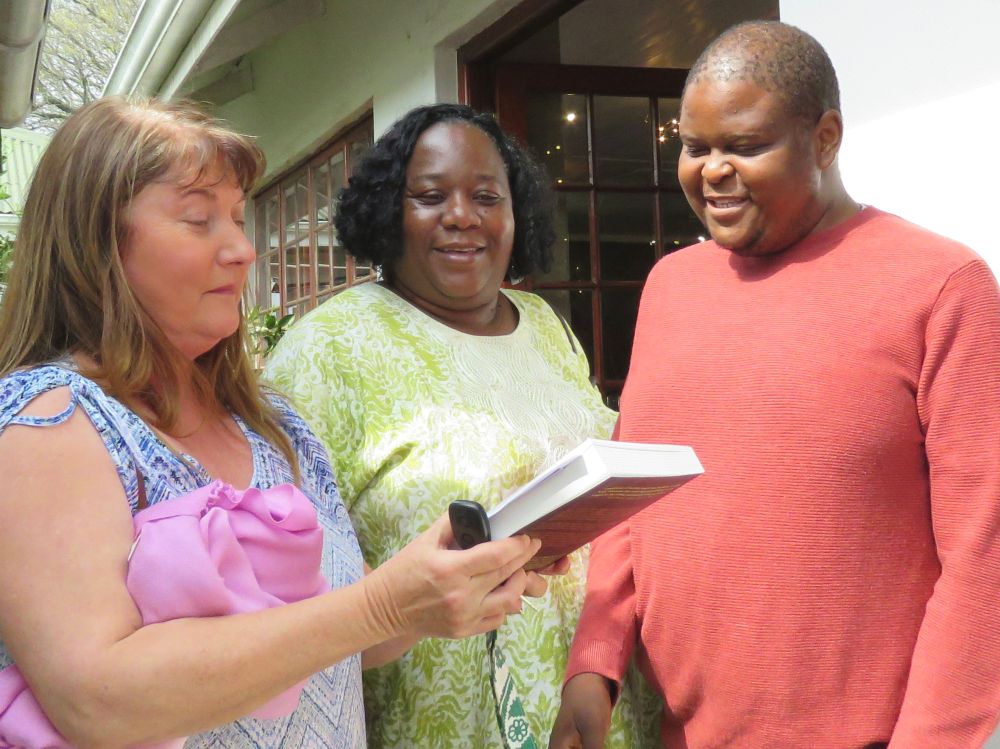
At lunch, there were plenty of opportunities to catch up with friends or engage the authors in conversation. “Some people think we live in a backwater here in Howick, but we have so many fabulous things, like this festival,” enthused Maudie Stravides. Jeni Halle, and her friend Ali Tucker from Durban, were thrilled to have discovered the Midlands Literary Festival. “Usually we fly to Grahamstown and Franschhoek for their book fairs, but this is only an hour away from home! We can’t wait for next year.”

After lunch, young Josh Crickmay described how honoured he felt to be invited to speak during the hour of the Festival that was always given to Dr Ian Player when he was alive. A broken, suicidal, autistic teenager, who dropped out of school at 15, Josh has produced a remarkable 300-page self-published coffee table book – Josh’s Big Year. This is a story of courage and triumph of the human spirit. Members of the audience also payed tribute to Josh’s parents Andrew and Kathy, who quit their jobs to rekindle Josh’s interests in birding, photography and writing, giving him a reason to live again. For an entire year they travelled to every corner of Southern Africa and spent seven weeks in the Amazon and Andes in what is known in birding circles as a “Big Year” which involves identifying as many bird species as possible in a single year. For those who missed the talk, check out www.joshcrickmay.comwhere Josh shares his most recent project in which he video blogs his adventures and highlights conservation issues.
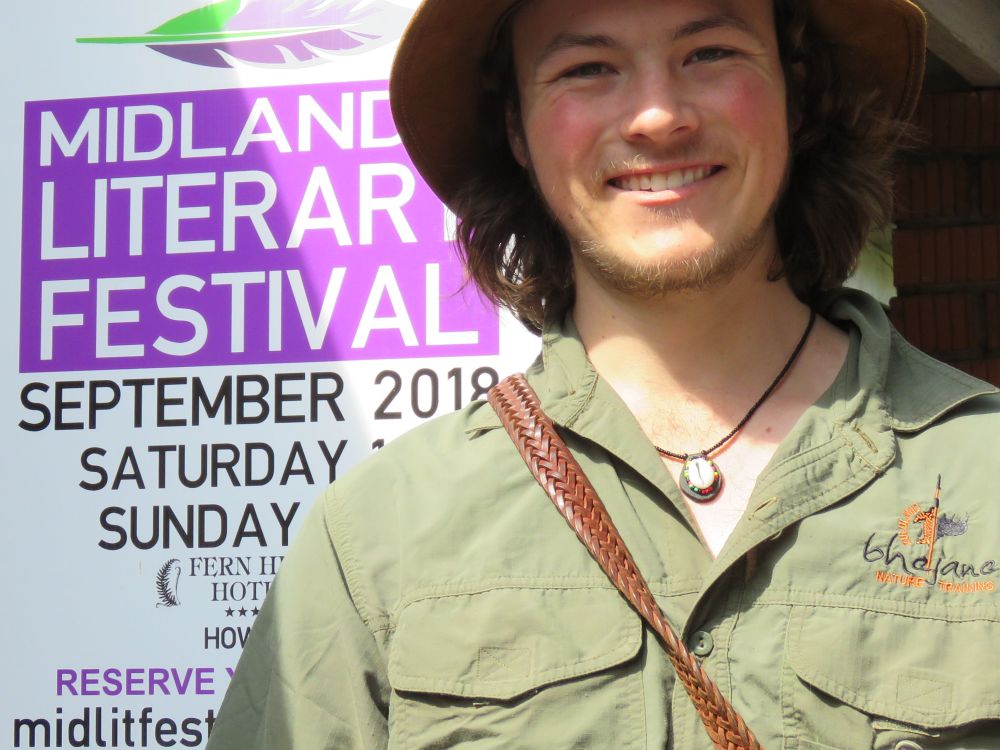
The festival closed with Gcina Mhlophe’s 60th birthday celebration. Gcina has participated in many past events so was pleased to be back amongst friends.

Children and adults from across the Midlands glued colourful hearts into a giant birthday card and wrote their own special wishes to this amazing lady.
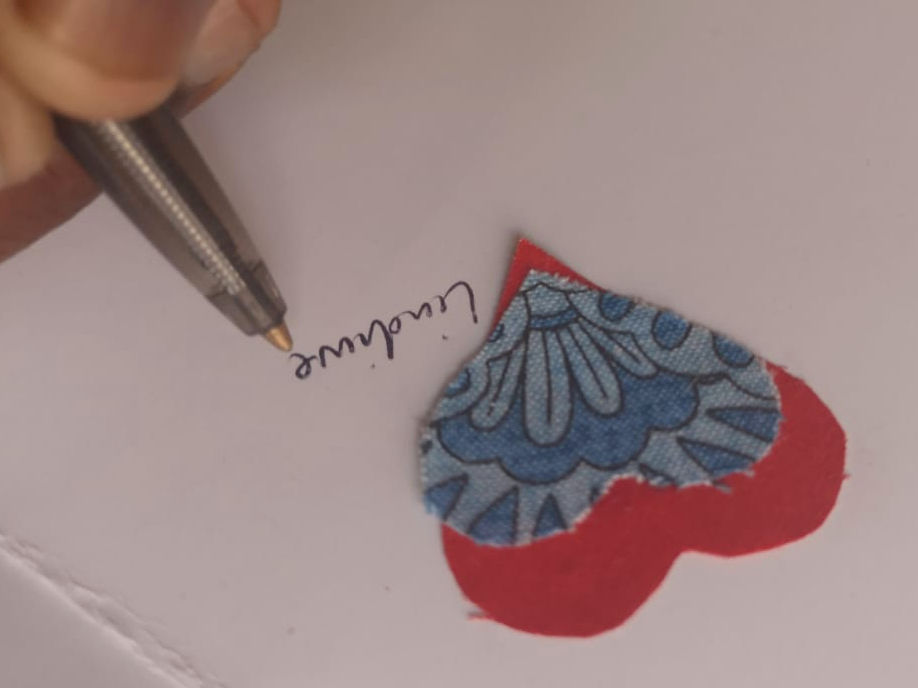
Sitting at her feet we were riveted by her dramatic storytelling and warmth. Children spontaneously adding to the conversation about her travels across the globe. Fyrne and Brooke Segal were intrigued that she had been to so many countries and eats honey wherever she goes. Their brother, Seth, commented that despite the story being so simple she told it in a way that made it very interesting.
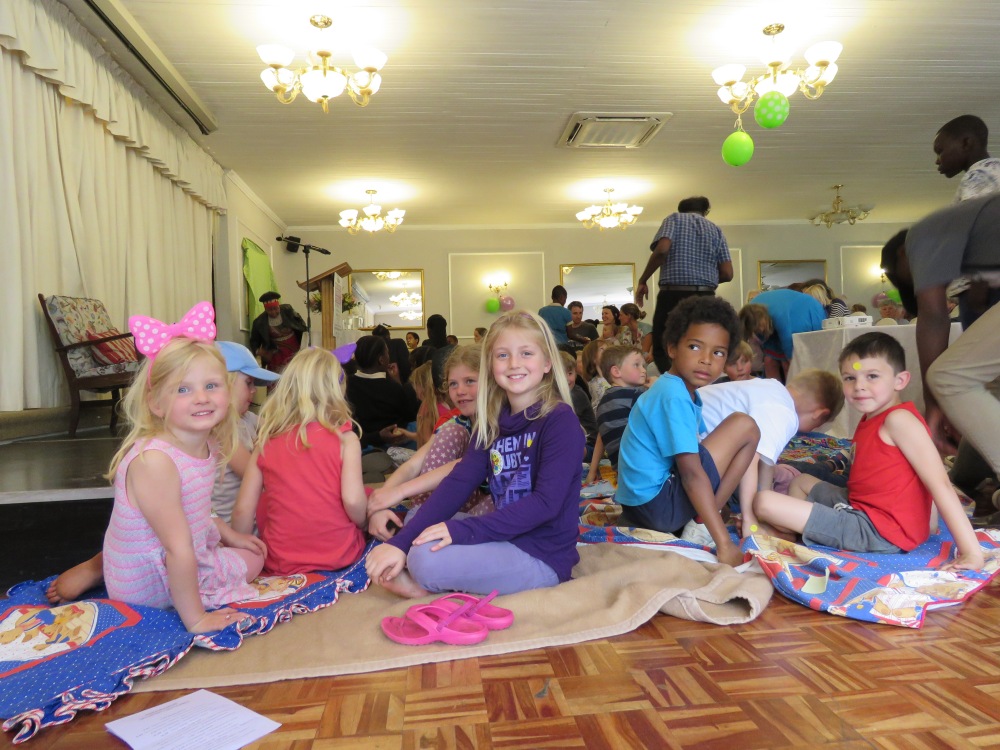
Tim Boettiger aka The White Zulu led the crowd in singing Happy Birthday and For She’s a Jolly Good Fellow in isiZulu before Gcina made a wish and cut her birthday cake.
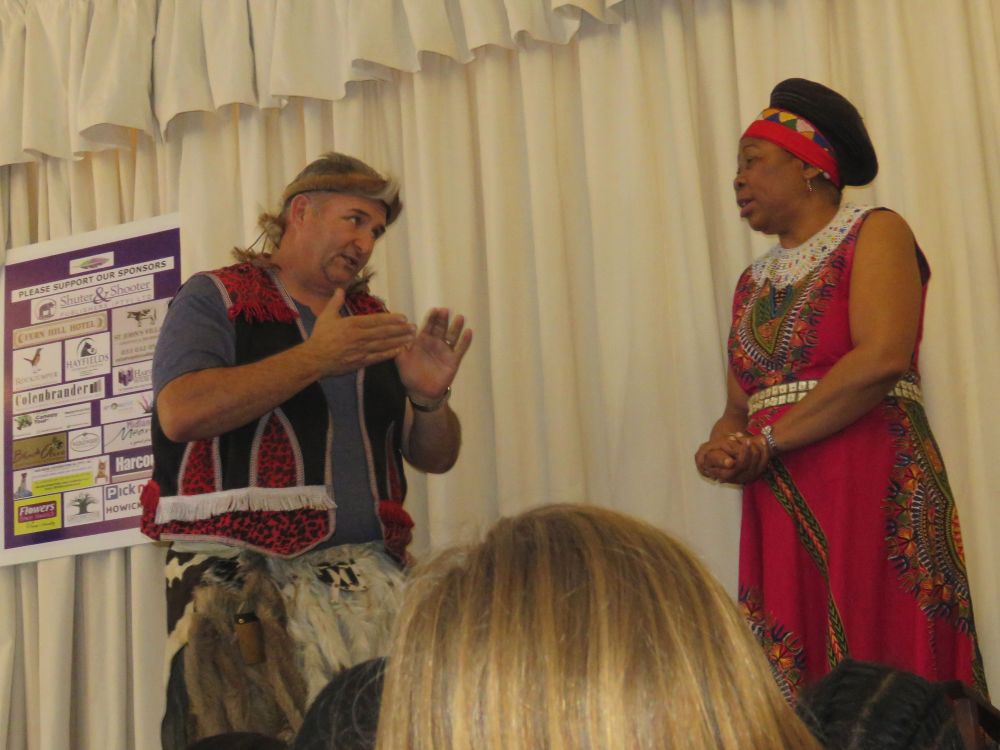
Filled with joy, we all tucked into a slice, posed for pictures with the birthday girl, shared happy memories we have of other Gcina encounters and reflected on a fabulous story-filled weekend.

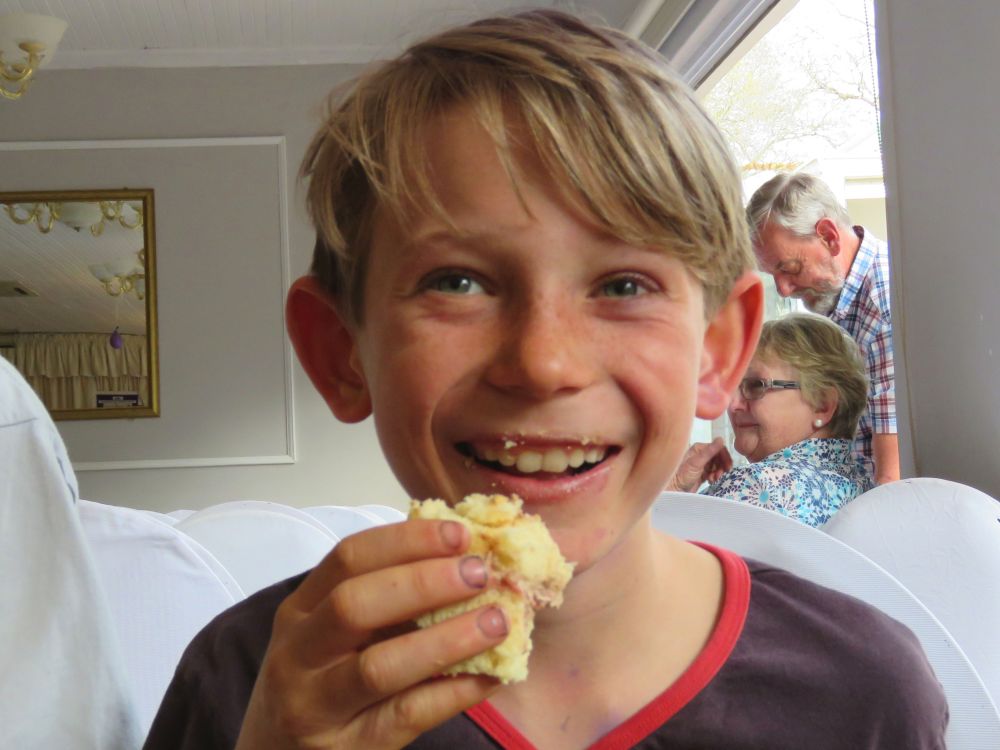
A beaming Darryl David said afterwards that it was his best festival ever. Mike Lowry called Darryl “The King of Literary Festivals – you never fail to raise the bar.”
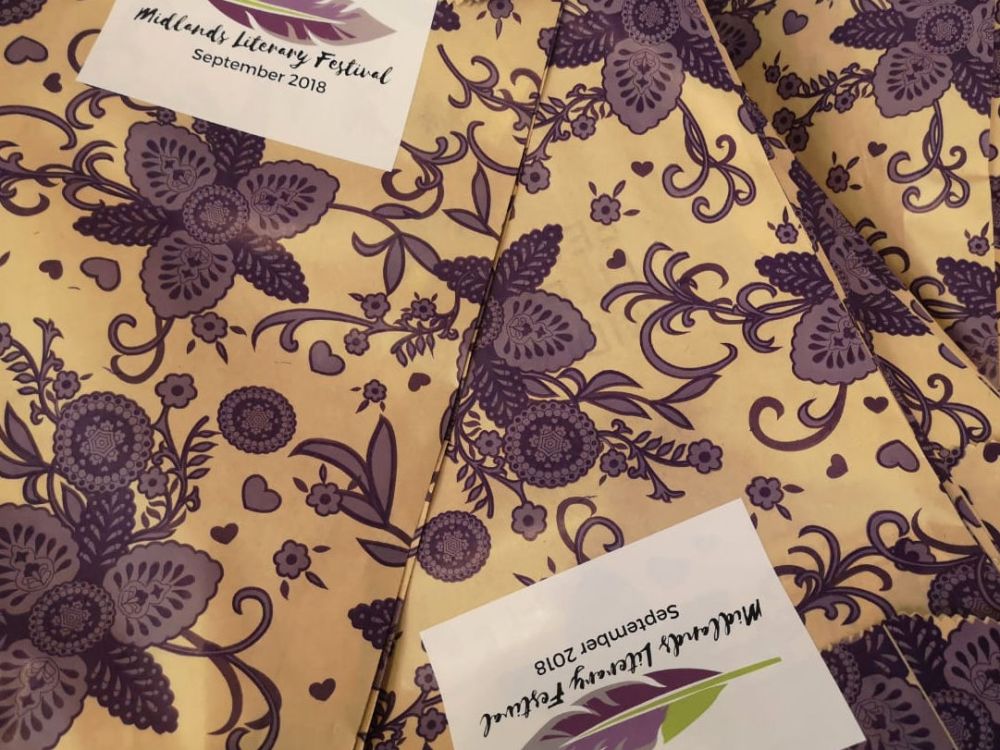
Winston Khuswayo, author of The Virtues Of Corporate Governance And Ethical Behaviour had a wonderful time at the festival. “I enjoyed very much presentations on self-publishing, something I am currently trying to do. I would like to be informed about future festivals so that I can plan accordingly. ” Certainly, we will do that Winston.
If you would like to be on the Midlands Literary Festival mailing list, so as not to miss a moment of MLF2019, do send a note to midlitfest@gmail.com.
Until the tenth edition of the Midlands Literary Festival – we wish you happy reading and prolific writing!
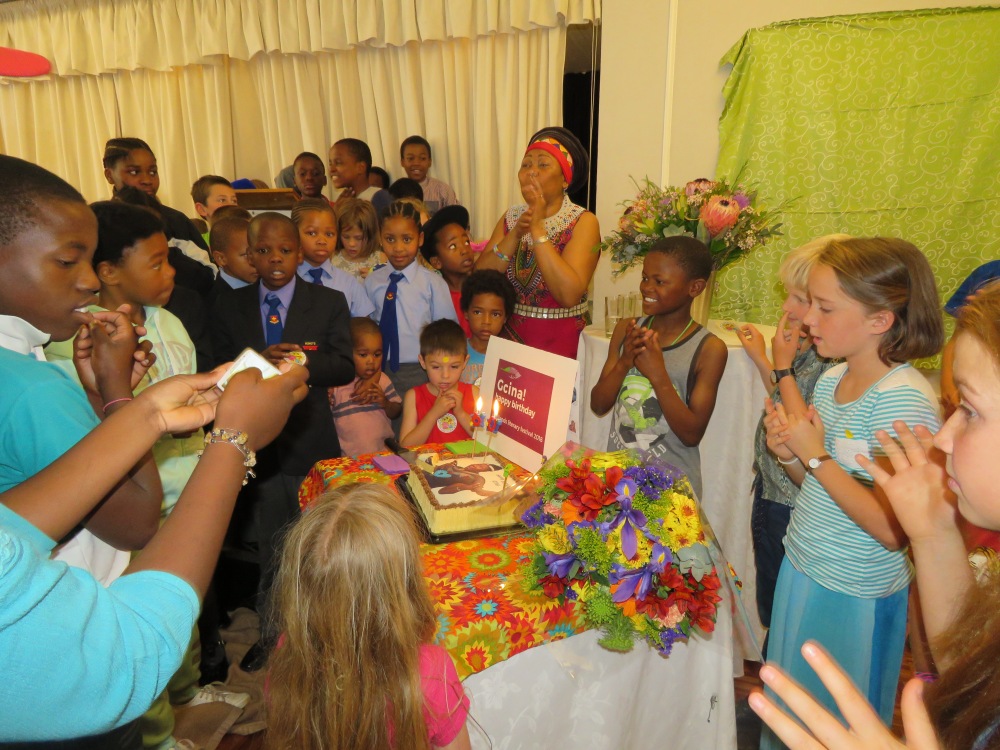

Hi, this is a comment.
To get started with moderating, editing, and deleting comments, please visit the Comments screen in the dashboard.
Commenter avatars come from Gravatar.